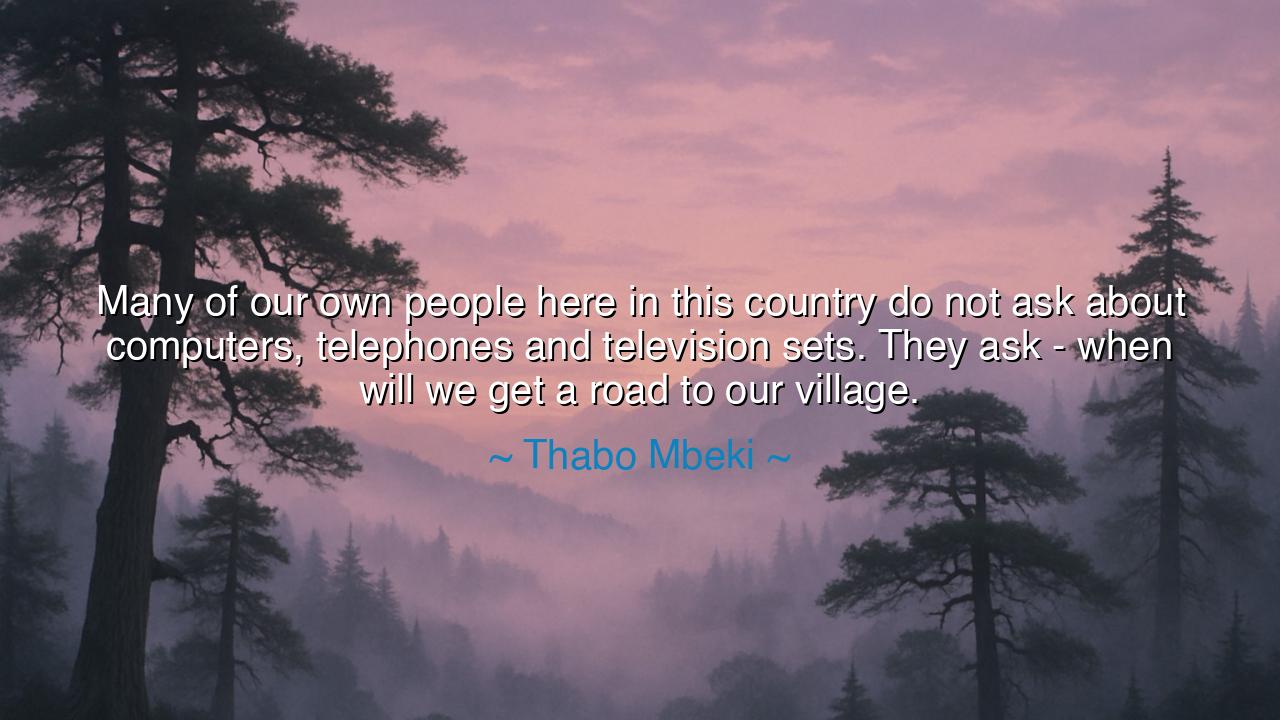
Many of our own people here in this country do not ask about
Many of our own people here in this country do not ask about computers, telephones and television sets. They ask - when will we get a road to our village.






Hear, O Children of the Earth, for the words of Thabo Mbeki carry wisdom not just for today, but for generations to come. "Many of our own people here in this country do not ask about computers, telephones and television sets. They ask – when will we get a road to our village." In this simple, yet profound statement, Mbeki calls us to look beyond the glittering technologies that consume much of our thoughts and hearts, and to reflect on the needs of those who remain, in the shadows of progress, forgotten and neglected.
In the days of old, the ancients built their cities upon the strength of roads. The roads were not mere pathways—they were the lifeblood of civilizations, connecting the isolated with the whole. The great empires of Rome, Persia, and China knew this truth: a road is not just a physical thing but a symbol of connection, of opportunity, of life. Without roads, there can be no trade, no communication, no progress. Mbeki’s words remind us of this ancient truth—that basic infrastructure is the cornerstone upon which all other developments are built.
In the modern world, the allure of computers, telephones, and televisions captures the imagination of many. We are told that these are the tools of the future, the instruments that will bring us into a new age. Yet, as Mbeki so clearly points out, there are many among us who do not ask for such luxuries. They do not wish for the devices that connect us to the world; they wish for the very foundations of life—for roads that will bring them closer to society, to opportunities, to the very fabric of civilization. The irony is palpable—technology advances in the cities, while in the villages, the road remains a distant dream.
Consider the tale of the African villages, where people live not with the endless buzzing of modern gadgets, but with the echoes of nature and the rhythms of simple life. The roads that should connect them to the world remain impassable, while elsewhere, men sit before glowing screens, their lives filled with distractions. Yet, the villagers ask not for the luxuries of the modern world, but for what they need most: a path to walk, a road to travel, to bring food, health, education, and connection to their homes. In this simple request lies the heart of human dignity and the true meaning of progress.
The words of Mbeki echo a deeper truth that we must all remember: the greatest advancements are not those that shine in the eyes of the privileged, but those that uplift the forgotten. True progress lies in reaching the furthest corners, in building not just for those who have, but for those who have not. Infrastructure—the humble road—is the very foundation upon which we can build a future for all. Without it, no amount of technology or wealth can heal the wounds of inequality.
Let us look to the wisdom of the ancients—they built not just for the elite, but for the common folk, for the people who plowed the fields, who carried water from the wells, who lived in the villages and towns that connected the kingdom together. They knew that roads were not just pathways for trade, but conduits for human connection. Today, as we stand at the crossroads of technology and development, we must ask ourselves: Are we building roads for our people? Are we ensuring that the foundations of our societies are strong enough for all to walk upon?
So, O children of the future, let this be your guiding principle: As you build the world of tomorrow, remember the roads that connect people to each other. Remember that true progress is not in the glittering technologies we admire, but in the basic human needs that we often overlook. And as you move forward, let your steps be guided by the wisdom of those who asked not for more machines, but for the simple roads that lead to life, to opportunity, and to the dignity of all people.






AAdministratorAdministrator
Welcome, honored guests. Please leave a comment, we will respond soon